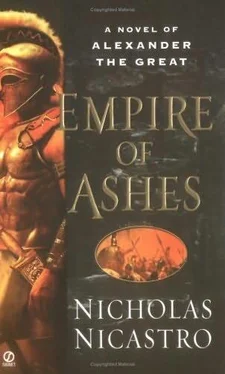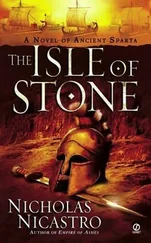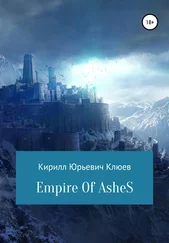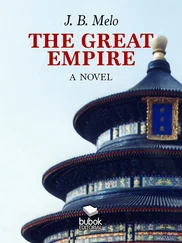Nicholas Nicastro - Empire of Ashes - A Novel of Alexander the Great
Здесь есть возможность читать онлайн «Nicholas Nicastro - Empire of Ashes - A Novel of Alexander the Great» весь текст электронной книги совершенно бесплатно (целиком полную версию без сокращений). В некоторых случаях можно слушать аудио, скачать через торрент в формате fb2 и присутствует краткое содержание. Жанр: Исторические приключения, на английском языке. Описание произведения, (предисловие) а так же отзывы посетителей доступны на портале библиотеки ЛибКат.
- Название:Empire of Ashes: A Novel of Alexander the Great
- Автор:
- Жанр:
- Год:неизвестен
- ISBN:нет данных
- Рейтинг книги:4 / 5. Голосов: 1
-
Избранное:Добавить в избранное
- Отзывы:
-
Ваша оценка:
- 80
- 1
- 2
- 3
- 4
- 5
Empire of Ashes: A Novel of Alexander the Great: краткое содержание, описание и аннотация
Предлагаем к чтению аннотацию, описание, краткое содержание или предисловие (зависит от того, что написал сам автор книги «Empire of Ashes: A Novel of Alexander the Great»). Если вы не нашли необходимую информацию о книге — напишите в комментариях, мы постараемся отыскать её.
Empire of Ashes: A Novel of Alexander the Great — читать онлайн бесплатно полную книгу (весь текст) целиком
Ниже представлен текст книги, разбитый по страницам. Система сохранения места последней прочитанной страницы, позволяет с удобством читать онлайн бесплатно книгу «Empire of Ashes: A Novel of Alexander the Great», без необходимости каждый раз заново искать на чём Вы остановились. Поставьте закладку, и сможете в любой момент перейти на страницу, на которой закончили чтение.
Интервал:
Закладка:
That was when Poseidon seized his chance. Sending forth a storm, he punished the very foundation of the mole until it gave way, collapsing in a heap on the seafloor. So completely was the structure destroyed that when Alexander came out to view the damage from this attack, all signs of his months of work, wet or dry, were erased. I was there during the episode Aeschines described, when the Tyrians gathered on their wall to jeer at Alexander as he stood among the debris.
These developments provoked fresh carpings from Nearchus, who complained that the city would never be taken if the Tyrians were left in command of the sea. This was no doubt intended to dissuade Alexander, since the enemy had a strong fleet and the Macedonians had none. Alexander nevertheless ordered the mole rebuilt at twice the width and with double the number of towers. His men, weary and discouraged, stripped an even greater area around the country for materials. Alexander, meanwhile, rode north with his personal guard. He was away for seven days.
The gods alone must know what the Tyrians thought of Alexander’s disappearance. We may suppose, though, that they believed he had given up and that the siege was finished; Poseidon himself must have assumed as much, since the winter storms ceased and the sea settled down. It was on one of these calm days that their lookouts sighted a fleet approaching from the north. They cheered again, for they thought it surely must be the Persians coming to drive the besiegers away for good, or perhaps a relieving force from Tyre’s daughter city of Carthage, riding to the rescue of their ancestral temples.
These illusions were shattered as the devices painted on the fleet’s sails came into view. The fleet, 200 ships strong, was a mixed force from Sidon and Cyprus; at the prow of the very first ship stood Alexander.
Now it was the Macedonians’ turn to cheer and their adversaries to groan. With such an overwhelming force against them, the Tyrians recalled their dispersed fleet, and took the additional defensive action of blocking their north and south harbor mouths with merchantmen. Alexander’s Sidonese allies showed their value immediately by launching fire ships against the obstructing vessels; several were burned, but the enemy replaced them. Alexander ordered a blockade on the city.
With the enemy fleet out of action, work on the second mole proceeded faster than on the first. The Tyrians responded by erecting wooden towers atop their walls to increase the range of their heavy artillery. With these engines they threw heavy boulders into the sea, hoping to impede the movement of Alexander’s ships. This strategy pleased Alexander, since the enemy was providing good material for his work crews. He sent out triremes to haul up the rocks and dump them at the head of the mole.
Perceiving their mistake, the Tyrians produced up a squadron of ram ships to attack the triremes. The ram ships were great armored vessels, with even their oar-shafts clad in bronze. Though they were slow and would easily have capsized in rougher seas, they caught the Macedonians by surprise, sinking several of their vessels and, in the process, further littering the landward channel with obstructions.
The Tyrians, having regained control of the waters under their city walls, came up to threaten the mole again. Fighting resumed along the causeway, as Alexander’s men took refuge in their towers. Bolts from the Macedonian artillery clanked harmlessly off the metal skins of the ram ships. Alexander, furious, ordered the immediate construction of his own armored fleet. This was completed within days, and launched with selected crews from among his Sidonese and Cypriot allies. Outnumbered, the enemy withdrew.
The allied triremes resumed pulling up the stones. To frustrate them, the enemy sent out waves of divers to cut their cables from underwater. The Tyrian swimmers, who seemed able to hold their breaths for superhuman lengths of time, also assaulted the mole from below, using metal hooks to work the cobbles loose from the tree branches the Macedonians had sunk there. These attacks did real damage to Alexander’s plan. Having no divers of like skill, he ordered the anchor ropes of his triremes replaced with iron chains, and boats with archers to patrol the channel and kill the Tyrians before they could submerge. The latter tactic met with scant success, but in any case the divers could do nothing against the chains, and gave up.
With the noose tightening around the town, the Tyrians tried to break the blockade by sallying out against the enemy ships at the north end of the island. A crack force of the city’s best fighters gathered behind a canvas screen erected at the harbor mouth. Coming out in mid-afternoon, when the Macedonians were rotating their crews, thirteen Tyrian ships rowed out in complete silence and again caught their enemy by surprise. All the blockading ships were taken and either burned or cast adrift in the swift current, to founder on the rocks downstream.
Learning of this attack, Alexander rushed to the fleet blocking the southern harbor and ordered it to pull for the other side. So quickly was this order obeyed that the Macedonians caught the Tyrians still at their destructive work. Upon seeing the reinforcements, and Alexander conspicuous at their head, the Tyrians made frantic signals for their scattered force to retire. The Macedonians fell on most of these before they could find shelter in the north harbor; only a handful of the enemy escaped, making the overall losses even for both sides. It was a draw Alexander could afford more than the Tyrians, however.
A strange inactivity then came over the defenders; their artillery fell silent, and the archers just sat on the walls, watching the Macedonians come ever closer. To the workers on the causeway, this stillness was most ominous.
In fact, the defenders were preparing a new weapon. The slings of their torsion catapults were replaced with bronze shields, the missiles abandoned for something far more noxious. Just as the mole came up under the walls, the Macedonian workers were seen to cry out, tear off their clothing, and cast themselves into the sea. Mystified, Alexander came out to investigate.
He soon learned that the Tyrians were using artillery to project loads of red-hot sand against his men. The effect of this weapon was to send down a spreading, molten cloud that destroyed anything it touched. Siege works were scorched, lungs seared, and skin burned as the sand worked into the seams of the men’s armor.
There was no counter-measure against this horror. Work on the mole was abandoned. Alexander, in despair, punished the Tyrians by using his biggest rock throwers against the landward walls. Two full days of constant pounding worked only a few cracks in the fortifications, which the Tyrians quickly filled in from behind. The bombardment was called off.
There seemed nothing more we could do. The winter and spring had been consumed by the siege, and summer had begun; no doubt somewhere Darius was using the time to strengthen his position. Alexander’s spies in Greece reported that the Lacedaemonians were trying to enlist the Athenians in an alliance against Macedon; accounts reached him that the Persian fleet was forcing open the port of Miletus. It seemed as if Nearchus’ advice was correct after all-Tyre must be bypassed.
Then a most unusual sign appeared. The waters in the channel began to churn. Onlookers gathered on both sides and watched in wonder as the great, dark back of an enormous sea-monster parted the waves. Given their reverses, there was great nervousness at this apparition in the Macedonian ranks, and the beginnings of outright panic among some of the more ignorant Thracian and Illyrian allies.
Alexander came to the shore to view the creature in the manner of a master inspecting a fine horse. Dismissing all talk of omens, he refused to consult Aristander on the matter, instead recounting what he had learned about such creatures from his tutor, Aristotle of Stageira.
Читать дальшеИнтервал:
Закладка:
Похожие книги на «Empire of Ashes: A Novel of Alexander the Great»
Представляем Вашему вниманию похожие книги на «Empire of Ashes: A Novel of Alexander the Great» списком для выбора. Мы отобрали схожую по названию и смыслу литературу в надежде предоставить читателям больше вариантов отыскать новые, интересные, ещё непрочитанные произведения.
Обсуждение, отзывы о книге «Empire of Ashes: A Novel of Alexander the Great» и просто собственные мнения читателей. Оставьте ваши комментарии, напишите, что Вы думаете о произведении, его смысле или главных героях. Укажите что конкретно понравилось, а что нет, и почему Вы так считаете.












